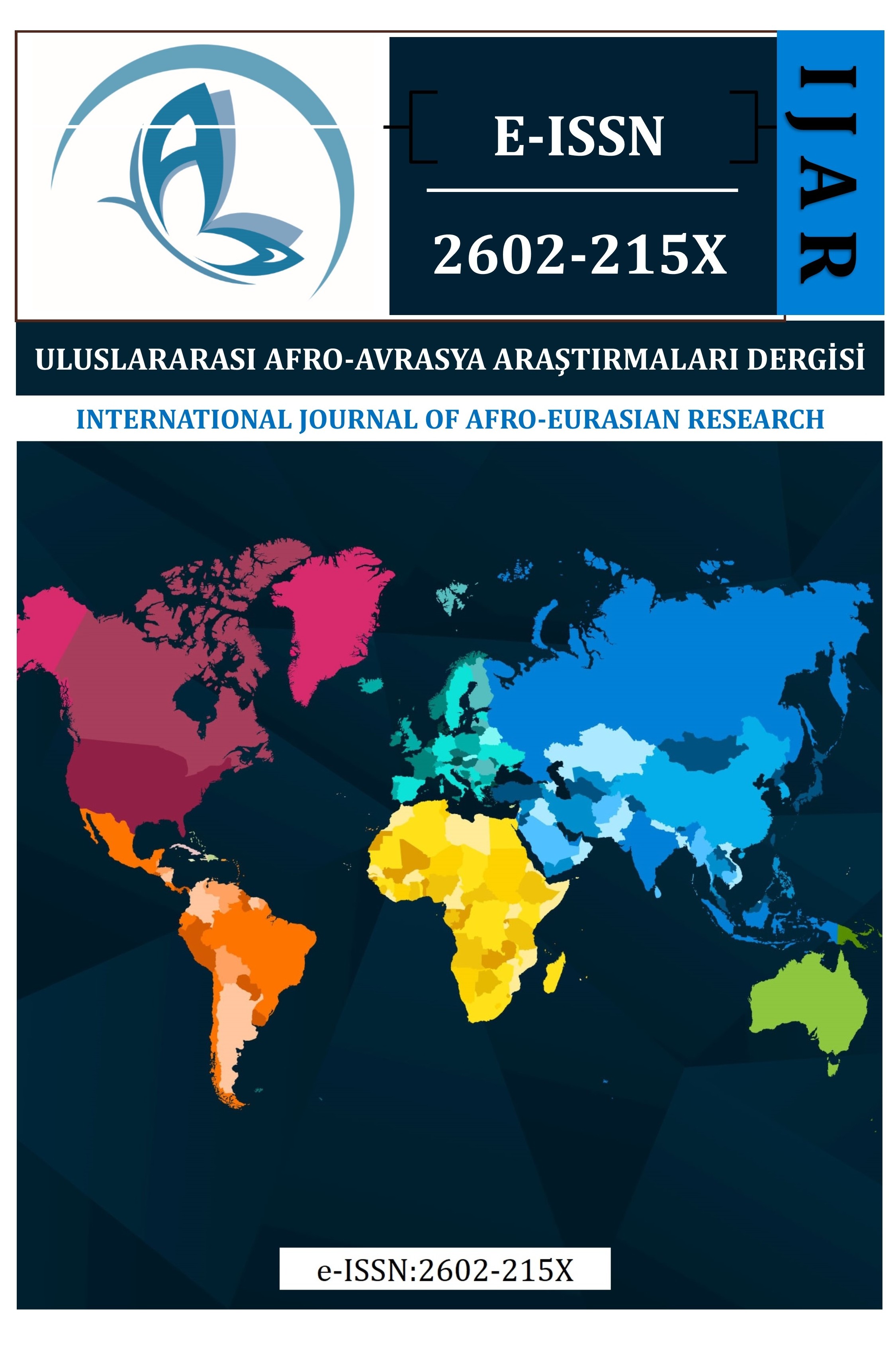DÖNÜŞEN DÜNYA DÜZENİNDE “BRICS” ve TÜRKİYE’YE ETKİSİ
BRICS, Küresel Ekonomi, Çok Kutupluluk, Asya, Türkiye
BRICS IN A CHANGING WORLD ORDER AND ITS EFFECT ON TURKEY
BRICS, Global Economy, Multipolarity, Asia, Turkey,
___
- “8th BRICS Summit: Terrorism, Economic Cooperation to Dominate Agenda”, (2016). New Indian Express, 15 Ekim.“BRICS 10th Summit: Here’s What The Five Countries Are Looking For”, (2018), Sunday Times, 26 Temmuz.“BRICS Liderler Zirvesi Sona Erdi”, (2017). Sputnik Türkiye, 5 Eylül.“Chinese Investment in Africa could Create National Economies 'Entirely Dependent on China', Say Experts”, (2018). The Independent, 15 Mayıs.“Erdoğan’dan BRICS’e Derecelendirme Kuruluşu Önerisi”, (2018). BusinessHT, 27 Temmuz.“Kredi Derecelendirme Kuruluşları”, 2016’da Türkiye”, (2016). SETA Yayınları.“NATO Summit Live Updates: Trump Pushes Allies to Increase Spending”, (2018). The New York Times, 11 Temmuz.Abdenur, A. (2016). “Rising Powers and International Security: the BRICS and the Syrian Conflict“, Rising Powers Quarterly, 1(1), s. 109-133.Brazil Ministry of Foreign Affairs (BMFA), (2018). “Information About BRICS”, http://brics.itamaraty.gov.br/about-brics/information-about-brics , (28.07.2018).BRICS 2017 China, (2017). “Brief Introduction of Previous BRICS Summits”, https://www.brics2017.org/English/AboutBRICS/previousSummits/ , (1.08.2018).BRICS 2018, (2018). “Previous Summits”, http://www.brics2018.org.za/previous-summits , (7.09.2018).Chang, M., Hu, J. ve Chu, H. (2018). “Resource Efficiency and Productivity Changes in the G7 and BRICS Nations” Pol. J. Environ. Studies, 27(6), s. 2463-2474.China Institute of International Studies, (2018). “The BRICS Mechanism: Growing in Maturity”, http://www.ciis.org.cn/english/2018-01/02/content_40128382.htm , (28.07.2018).Dal, E. (2018), “10. Güney Afrika BRICS Zirvesi, BRICS Plus ve Türkiye” Anadolu Ajansı, 26 Temmuz.Dilek, Ş. (2018). “The Rise of Asia Against the Weakened Western Alliance”, The New Turkey, 28 June.Dinç, C. ve Yetim, M. (2011). Türk Dış Politikasında Eksen Kayması Tartışması, Ortadoğu’ya Açılım, Gazze ve İran Konularına Diplomasi ve Köşe Yazarlarının Bakışı”, (Ed.) Erol, M. Türk Dış Politikasında Strateji Arayışları, Barış Kitapevi, Ankara.Erdem, M. (2016). “BRICS Koşullu İhtiyat-Fonu Düzenlemesi: Hukuksal ve Kurumsal İnceleme”, İnönü Üniversitesi Hukuk Fakültesi Dergisi, 7(1), s. 295-350.Export-Import Bank of India, (2016) “Intra-BRICS Trade: An Indian Perspectıve”, https://www.eximbankindia.in/Assets/Dynamic/PDF/Publication-Resources/ResearchPapers/80file.pdf , (13.10.2018).Flanders, S. (2011). “The Global Financial Crisis and The BRICS”, BBC, 21 Kasım.Garrie, A. (2018). The Shanghai Cooperation Organisation and BRICS Should Combine to Form a Single Cohesive Group”, , https://www.eurasiafuture.com/2018/06/07/the-shanghai-cooperation-organisation-and-brics-should-combine-to-form-a-single-cohesive-group/ , (30.07.2018).Gilpin, R. (1987). The Polical Economy of International Relations, Riınceton Universıity Press, New Jersey.Gladun, E. (2018). “The BRICS: A Major Participant in the Multipolar World Order”, 5 BRICS Law Journal, 5(1), s.169-177.Gumede, W. (2014). “The Brics Development Bank can Release Africa from World Bank Tyranny”, The Guardian, 17 Temmuz.Gür, N. (2015). “G20 ve Küresel Finans Yönetişimi”, SETA Analiz, Sayı: 129, Hawsworth, J. ve Chan, D. (2015), “The World in 2050 Will The Shift in Global Economic Power Continue”, PWC, Londra.Houlton, S. (2009). “First BRIC Summit Concludes”, DW, 16 Haziran .IMF, (2018). “IMF Members Quotas and Voting Power, and IMF Board of Governors”, htt.p://www.imf.org/external/np/sec/memdir/members.aspx , (1.09.2018).India Ministry of External Affairs (IMEA), (2013). “5th BRICS Summit - eThekwini Declaration and Action Plan”, http://www.mea.gov.in/bilateral-documents.htm?dtl/21482 , (1.08.2018).IPEA, (2014). “Learn About BRICS”, http://www.ipea.gov.br/forumbrics/en/learn-about-brics.html , (28.07.2018).Mckinley, T. (2018). “BRICS to Play a Leading Role in Driving Future Global Economic Growth”, https://www.ineteconomics.org/perspectives/blog/brics-to-play-a-leading-role-in-driving-future-global-economic-growth , (28.07.2018).NDTV, (2018). “Highlights of Fourth BRICS Summit”, https://www.ndtv.com/business/highlights-of-fourth-brics-summit-300845 , (1.08.2018).New Development Bank (NDB), (2018). “About Us”, https://www.ndb.int/about-us/essence/history/, (1.08.2018).PWC, (2017). “The Long View How Will The Global Economic Order Change by 2050”, https://www.pwc.com/gx/en/world-2050/assets/pwc-world-in-2050-summary-report-feb-2017.pdf , (18.07.2018).Stiglitz, E.J. (2002). “Küreselleşme Büyük Hayal Kırıklığı”, (Çev. Arzu Taşçıoğlu-Deniz Vural), Plan B Yayınları, İstanbul.Stuenkel, O. (2010). “Looking Back: The 2nd BRIC Summit in Brasília in 2010”, http://www.postwesternworld.com/2014/06/15/looking-summit-brasilia/ , (18.07.2018).Summers, T. (2016). “Thinking Inside the Box: China and Global/ Regional Governances” Rising Powers Quarterly, 1(1), s. 23-31.T.C. Dışişleri Bakanlığı, (2018). “Türkiye’nin Kalkınma İşbirliği: Genel Özellikleri Ve En Az Gelişmiş Ülkelere Yönelik Yaklaşımı”, http://www.mfa.gov.tr/turkiyenin-kalkinma-isbirligi.tr.mfa , (29.07.2018).University of Toronto, (2011). “Sanya Declaration”, http://www.brics.utoronto.ca/docs/110414-leaders.html , (1.08.2018).University of Toronto, (2014). “VII BRICS Summit Ufa Declaration”, http://www.brics.utoronto.ca/docs/150709-ufa-declaration_en.pdf, (1.09.2018).Ünay, S. ve Kayıkçı, F. (2013). “Çok-Kutuplu Küresel Ekonomik Düzen ve BRICS: Kriz sonrası Ekonomik Dönüşüm”, (Ed.) Şenses, F., Öniş, Z. Ve Bakır, C., Ülke Deneyimleri Işığında Küresel Kriz ve Yeni Ekonomik Düzen, İletişim Yayınları, İstanbul.Wouters, J. ve Kerckhoven, S. (2018). “A European Perspective on the G20 and the BRICS”, International Organisations Research Journal, 13(2), s. 60–75. Zhao, S. (2016). “China as a Rising Power Versus the US-led World Order”, Rising Powers Quarterly, 1(1), s. 13-21.Zhongying, P., Ruiping W. (2013). “China's Strategic Response to Global Governance”, 41 China Int'l Stud. s.129-146.
- Başlangıç: 2016
- Yayıncı: Hakan ARIDEMİR
TÜRKİYE'DE YAŞAYAN GEÇİCİ KORUMA ALTINDAKİ SURİYELİLERİN VERGİ ADALETİ ÜZERİNDEKİ ETKİLERİ
TÜRKİYE’NİN DOĞAL GAZ BAĞIMLILIĞI VE ALTERNATİF ENERJİ KAYNAKLARI ÜRETİMİNİN GEREKLİLİĞİ
ÖTANAZİ: TÜRK HUKUKU AÇISINDAN BİR DEĞERLENDİRME
TEDARİK ZİNCİRİ YÖNETİMİNİ CARREFOUR NASIL GERİ DÖNÜŞTÜRDÜ:BİRLEŞİK ARAP EMİRLİKLERİNDEN BİR VAKA
RUSYA FEDERASYONU ANAYASAL DÜZENİNDE ÖLÜM CEZASI VE ANAYASA MAHKEMESİNİN YAKLAŞIMI
DOLAYLI BİR ÇEVİRİ OLARAK “THE SIEGE” İSMAİL KADERE’NİN İNGİLİZCESİ
SİGORTA SEKTÖRÜNÜN HAYAT DIŞI BRANŞININ FİNANSAL VE TEKNİK PERFORMANSLARININ ANALİZİ
İnci Merve ALTAN, Murat YILDIRIM
“KİTAB-İ DEDE KORKUT”: TANRIÇILIKTAN İSLAMA KEÇİDİ İNİKAS EDEN TOTAL MODELLEŞTİRİCİ SİSTEM
